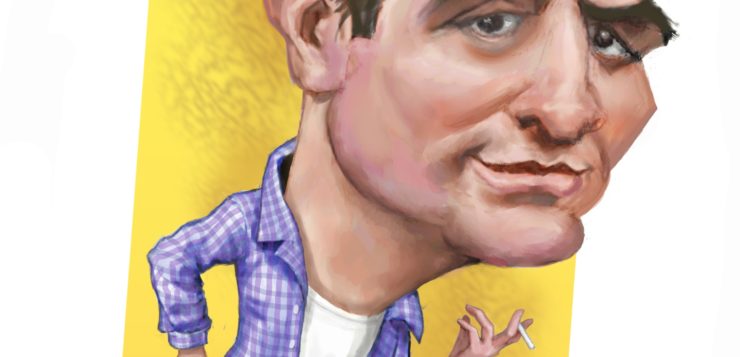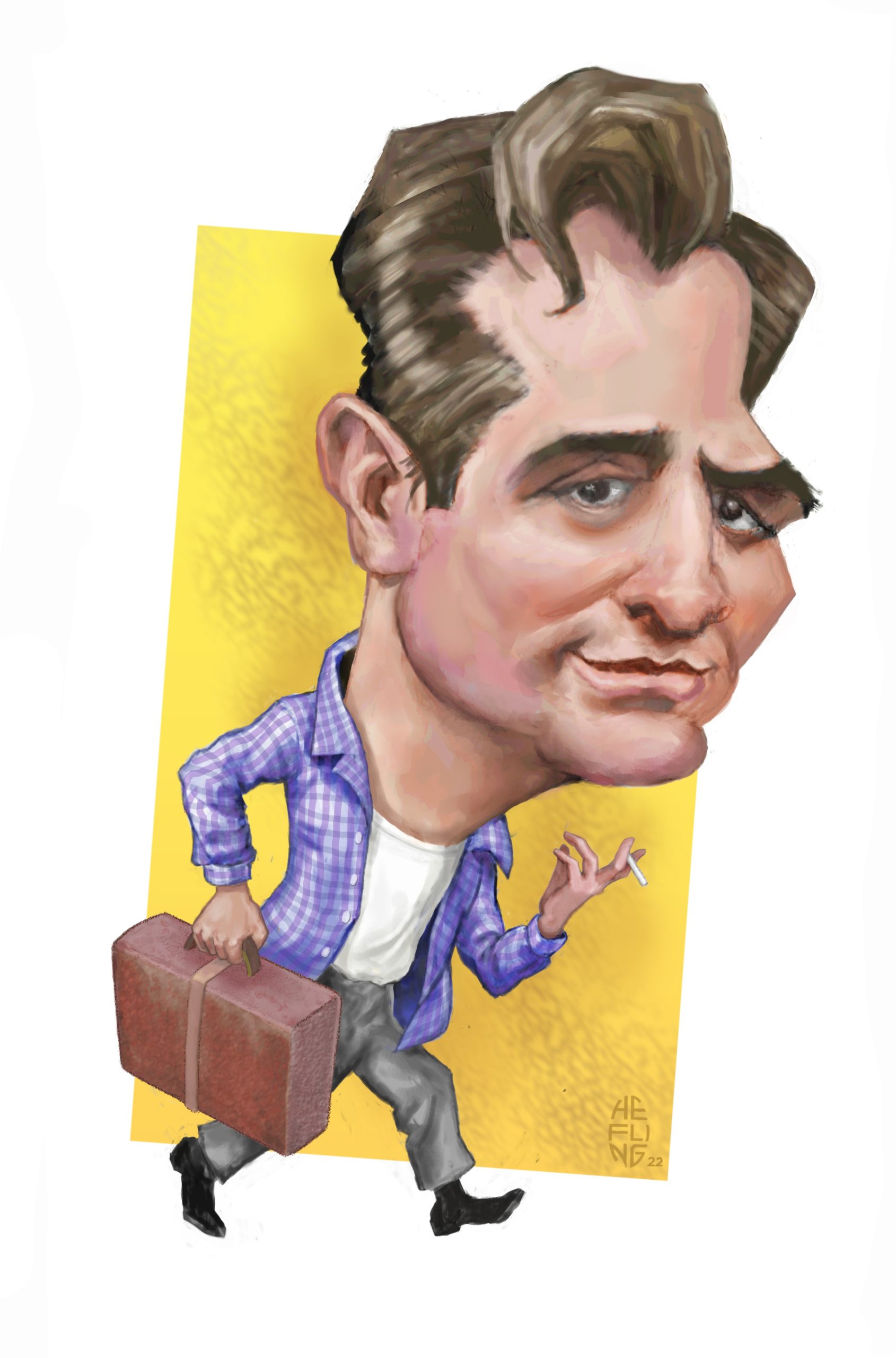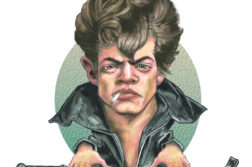AS JACK KEROUAC’S centennial year draws to a close, I have been contemplating the open book of his sexuality. He married three times, had countless affairs with women, and was not above crude expressions of homophobia. However, he allied himself with his gay friends Allen Ginsberg and William S. Burroughs in the creation of the Beat Movement, and, according to Ginsberg, there were times when Kerouac had sex with him or other men. Kerouac didn’t hide his strong feelings for Neal Cassady, fictionalized as Dean Moriarty in On the Road; nor did he mind admitting in Doctor Sax and Maggie Cassidy to a youthful crush on another boy. Given that he was writing and publishing during an era when the admission of such feelings rarely appeared in mainstream literature, Kerouac deserves credit for his sexual candor.
A native of Lowell, Mass., Jean-Louis Lebris de Kerouac (1922–1969) was the youngest of three children born to Leo and Gabrielle Kerouac, a working-class couple with French-Canadian roots. The Kerouacs’ oldest child, Gerard, died at age nine of rheumatic fever when Jack was four. It was a signal trauma in the future author’s life and—along with his Roman Catholic mysticism—accounts for the strains of sorrow and morbidity that run through his books. Those same strains show up when his fictional personas attempt to have serious relationships with women. Sometimes their discomfort shades into appalling misogyny, as in this passage from Visions of Gerard (1958): “Praise a woman’s legs, her golden thighs only produce black nights of death, face it—Sin is sin and there’s no erasing it—We are spiders. We sting one another.” Kerouac’s association of hetero sex with death may have made it easier for him to justify his occasional forays into homosexuality, even though he shared many of the anti-gay prejudices common in mid-20th-century America.
In Doctor Sax (1959), a darkly whimsical novel about his early years written in the free-flowing style he called “spontaneous prose,” Jackie Duluoz’ retrospective descriptions of himself indicate that he had a queer childhood full of fear, fantasy, and wide-ranging passions. At one point, he confesses his love for a schoolmate:
I was in love with Ernie Malo, it was a real love affair at eleven—I tiptoed on his fence heartbreakingly across the street from school—I hurt him once with my foot on the fence, it was like hurting an angel, at Gerard’s picture I said my prayers and prayed for Ernie’s love. … Ernie was very beautiful to my eyes—it was before I began to distinguish between the sexes—as noble and beautiful as a young nun—yet he was a little boy, tremendously grown up (he became a sour Yankee with dreams of small editorships in Vermont).
The story of Ernie Malo goes no further in Doctor Sax, but the same character shows up in Maggie Cassidy (1959), also written in spontaneous prose and growing out of Kerouac’s high school love affair with a girl named Mary Carney. Like the narrator of Doctor Sax, Jack Duluoz recalls praying at the photo of his brother “to insure the friendship, respect and grace of Ernie Malo. … I found him as beautiful as seven times the pick because his rosy cheeks and white teeth and the eyes of a woman dreaming, of an angel maybe, bit my heart.”
Unlike most of his literary contemporaries, Kerouac did not dismiss what he called the “little dramas” of early love and desire. Just a couple of pages before the tangent about Ernie Malo, Jack Duluoz remembers an evocative episode involving his friend Lousy: “The first night I met [Pauline] all I could do was smell her hair in my bed, in my hair—told this to Lousy, I smelt her in his hair too. It interested Lousy. When I told him we’d finally kissed the night before … Lousy wanted me to kiss him like I had kissed Pauline. We did it, too; the others didnt even stop talking about the team.” Perhaps the other boys sitting around Jack’s bedroom didn’t suspect that the kiss was anything other than play-acting—or maybe they saw it as part of a homoerotic world they already had experienced on their own. In any case, Kerouac’s willingness to include these brief episodes about Lousy and the alluring Ernie Malo in novels published in the 1950s is remarkable. It is as if he’s daring his critics to object while privately wagering that most everyone has had early experiences that fall outside the straight and narrow.
In On the Road (1957), Kerouac’s alter ego Sal Paradise doesn’t kiss Dean Moriarty or pray for Dean to love him back. However, Sal cannot stop rhapsodizing over the young car thief and womanizer that many would find unsettling. Early in the novel that popularized the Beat Movement, Sal Paradise compares his new friend to “a young Gene Autry—trim, thin-hipped, blue-eyed, with a real Oklahoma accent—a sideburned hero of the snowy West.” Soon thereafter, caught up in the excitement that Dean has brought to his stagnant existence, Sal acknowledges the transactional nature of their budding relationship:
He was simply a youth tremendously excited with life, and though he was a con-man, he was only conning because he wanted so much to live and to get involved with people who would otherwise pay no attention to him. He was conning me and I knew it (for room and board and “how-to write,” etc.), and he knew I knew (this has been the basis of our relationship), but I didn’t care and we got along fine—no pestering, no catering; we tiptoed around each other like heartbreaking new friends. I began to learn from him as much as he probably learned from me.
Sal’s infatuation with a known hustler had begun even before they met, when he read letters Dean wrote from a New Mexico reform school to a mutual friend. That friend has no interest in tutoring Dean when he arrives in New York City with his new bride, but Sal is happy to let the restless, oversexed young man take up his time. Dean’s raw physicality and nonsensical babbling pull Sal back from the edge of despair.
On one occasion, after he and Dean have had a falling-out, Sal tries to make a life for himself in Denver, where Dean grew up. But without his friend around, Sal slips into a terrible depression. With money he gets from a female friend, he takes off for San Francisco and arrives in the middle of the night at the home Dean shares with his second wife: “He came to the door stark naked and it might have been the President knocking for all he cared. He received the world in the raw. ‘Sal!’ he said with genuine awe. ‘I didn’t think you’d actually do it. You’ve finally come to me.’”
It turns out that Dean is miserable in his marriage, in poor health, and desperate to leave. Sal thinks: “I was glad I had come, he needed me now.” He offers to pay Dean’s way back to New York and proposes they then go to Italy. It’s as close as he comes to admitting he loves Dean and wants him to himself:
I tried to remember everything he’d done in his life and if there wasn’t something back there to make him suspicious of something now. Resolutely and firmly I repeated what I said—“Come to New York with me; I’ve got the money.” I looked at him; my eyes were watering with embarrassment and tears. Still he stared at me. Now his eyes were blank and looking through me. It was probably the pivotal point of our friendship when he realized I had actually spent some hours thinking about him and his troubles, and he was trying to place that in his tremendously involved and tormented mental categories. Something clicked in both of us. In me it was suddenly concern for a man who was years younger than I, five years, and whose fate was wound with mine across the passage of the recent years; in him it was a matter that I can ascertain from what he did afterward. He became extremely joyful and said everything was settled.
Self-conscious and unable to talk about what has just happened between them, the two men stand on the sidewalk near Dean’s home and behold a Greek wedding party—an ancillary sign that they are officially a couple. Their trip back East reveals that Dean cannot commit to Sal any more than he can to his many female lovers, but it is a sweet and telling moment nonetheless.
By the end of On the Road, Sal wants to believe he has found “the girl with the pure and innocent dear eyes that I had always searched for and for so long. We agreed to love each other madly.” Sal tells Dean that he and his girlfriend Laura intend to save their money and move to San Francisco. Dean shows up at their apartment soon after, a gibbering wreck. He eventually confesses “in a sudden moment of gaping wonder” why he rushed across the country: “Well and yes, of course, I wanted to see your sweet girl and you—glad of you—love you as ever.”
In full retreat from this tender declaration, Sal rejoices when Dean’s wife in San Francisco invites her wayward husband to come home. Dean asks him for a ride to Penn Station, but Sal turns him down because Remi, a tiresome and pompous friend of Sal’s, doesn’t want Dean along on the double date he has planned for the evening: “So Dean couldn’t ride uptown with us and the only thing I could do was sit in the back of the Cadillac and wave at him. … Dean, ragged in a motheaten overcoat he brought specially for the freezing temperatures of the East, walked off alone, and the last I saw of him he rounded the corner of Seventh Avenue, eyes on the street ahead, and bent to it again.”
The novel closes with a one-paragraph prose poem, a paean to Sal’s travels and his continued longing for the friend he has abandoned just as Dean earlier in the novel had abandoned him: “The evening star must be drooping and shedding her sparkler dims on the prairie, which is just before the coming of complete night that blesses the earth, darkens all rivers, cups the peaks and folds the final shore in, and nobody, nobody knows what’s going to happen to anybody besides the forlorn rags of growing old, I think of Dean Moriarty, I even think of old Dean Moriarty the father we never found, I think of Dean Moriarty.” This famous ending brings together Sal Paradise’s awe of the beautiful country he has traveled with his love for the friend he longs to be with but can no longer follow to the ends of the earth. The presence of his “girl” signals that he has chosen, more or less by default, the conventions of the straight world.
Kerouac himself did not necessarily think this was the right choice. In response to a letter from Elbert Lenrow, whose course on the 20th-century American novel Kerouac had taken at the New School for Social Research, he rebuked the older man for criticizing the ending of On the Road: “Almost like a child you incensedly cry to me ‘Since when is a bookie more important than a man in a motheaten coat’ (concerning the last scene in the book) as tho it was my own moral idea, as tho I was a spokesman for such ideas, instead of an American Novelist working in the field of Realism.” His distinction between his own views and his character’s actions belies the common assumption that Kerouac’s novels are just thinly veiled autobiographies. Perhaps more to the point, he does not condone Sal’s decision to let Dean walk away.
At the end of his letter to Lenrow (written late in 1957), Kerouac makes another important point that shows both his fragile ego and his awareness of the warping power of prejudice: “But I am well loved. Every single woman I’ve met in the past week (excepting dikes) has wanted to make love to me (married or not), at least secretly. I am well loved by almost all men. It’s the system that rejects me, and you, and all of us. The system of ignorance. It bears watching, that lil old system.” He doesn’t specify whether the men who love him want to make love to him as all the straight women do, but he certainly doesn’t foreclose that possibility. And he’s right about “the system”—the systemic prejudices that infiltrate the minds and hearts of individuals. Kerouac himself was not immune to ignorant prejudice, including homophobia, but at his best he was more self-aware than most and able to bring solace and pleasure to the legions of readers who came to love not only his books but the man himself. If Kerouac had lived to see his hundredth birthday, I think that realization would have made him smile.
Hilary Holladay is the author of Herbert Huncke: The Times Square Hustler Who Inspired Jack Kerouac and the Beat Generation and co-editor of What’s Your Road, Man? Critical Essays on Jack Kerouac’s On the Road.






